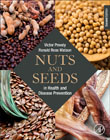
Nuts and Seeds in Health and Disease Prevention
Preedy, Victor R.
Watson, Ronald Ross
Nuts and Seeds in Health and Disease Prevention, Second Edition investigates the benefits of nuts and seeds in health and disease prevention using an organizational style that will provide easy-access to information that supports identifying treatment options and the development of symptom-specific functional foods. The use of nuts and seeds to improve human nutritional status has proven successful for a variety of conditions, including in the treatment of high cholesterol, reduced risk of Type-2 Diabetes, and weight control. The book examines seeds and nuts as agents that affect metabolism and other health-related conditions and explores the impact of compositional differences between various seeds and nuts, including differences based on country of origin and processing technique. The book also includes methods for analysis of seed and nut-related compounds. Written for nutrition researchers, nutritionists, food scientists, government regulators of food, and students of agriculture, oils and feeds, nutrition and life sciences, this book is sure to be a welcomed resource. Identifies options and opportunities for improving health through the consumption of nut and seed productsProvides easy access to information that supports the identification of treatment optionsContains insights into health benefits that will assist in development of symptom-specific functional foodsExamines seeds and nuts as agents that affect metabolism and other health-related conditionsExplores the impact of compositional differences between various seeds and nuts, including differences based on country of origin and processing techniqueIncludes methods for analysis of seed and nut-related compound INDICE: Section 1: Seeds as Foods in Health and Disease Prevention 1. Whole and Ground Chia (Salvia hispanica L.) Seeds, Chia Oil: Effects on Plasma Lipids and Fatty Acids 2. Cocoa (Theobroma cacao) Seeds and Phytochemicals in Human Health 3. Soursop (Annona muricata L.) Seeds, Therapeutic and Possible Food Potential 4. Lepidium sativum seeds 5. Cumin (Cuminum cyminum L.) Seed Volatile Oil: Chemistry and Role in Health and Disease Prevention 6. Lentil (Lens culinaris) seeds 7. Moringa oleifera Seeds and Oil: Characteristics and Uses for Human Health 8. The Nutritional Value and Health Benefits of Chickpeas and Hummus 9. Sesame (Sesamum indicum L.) Seeds in Food, Nutrition, and Health 10. Milk Thistle (Silybum marianum L. Gaert.) Seeds in Health 11. Sunflower (Helianthus annuus L.) Seeds in Health and Nutrition 12. Coriandrum Sativum: characterization, biological activities and application 13. Fatty Acid Content of Commonly Available Seed 14. Tocopherols and Tocotrienols in Common and Emerging Dietary Sources: Occurrence, Applications, and Health Benefits 15. Seeds in Cardiovascular Health 16. Health Benefits of Peanut (Arachis hypogaea L.) Seeds and Peanut Oil Consumption 17. Blend of sesame and Rice Bran Oils lowers Hyperglycemia and Improves the Lipids 18. Cardamom (Elettaria cardamomum Linn. Maton) Seeds in Health 19. Black Soybean (Glycine max L. Merril) SeedsT Antioxidant Capacity 20. Flax Seed (Linum usitatissimum) Fatty Acids 21. Use of Jackfruit (Artocarpus heterophyllus) Seeds in Health 22. Antibacterial Activity of Grape (Vitis vinifera, Vitis rotundifolia) Seeds 23. A Novel Extract of Fenugreek Husk Alleviates Postmenopausal Symptoms and Helps to Establish Hormonal Balance 24.Carob (Ceratonia siliqua L.) Seeds, Endosperm and Germ Composition, and Application to Health 25. Usage and Significance of Fennel (Foeniculum vulgare Mill.) Seeds in Eastern Medicine 26. Legumes Have a Low Contribution to the Total Energy Intake of the Mexican Population 27. Pulses in the Dietary Management of Diabetes 28. Current Advances in the Metabolomics Study on Lotus Seed Section 2: Nuts as Foods in Health and Disease Prevention 29. Usage of Date (Phoenix dactylifera L.) Seeds in Human Health and Animal Feed 30. Nuts in Cardiovascular Health 31. Health Benefits of Peanut (Arachis hypogaea L.) and Peanut Oil Consumption 32. Consumption and non-communicable diseases: evidence from epidemiological studies 33. Protective role of Nigella sativa and thymoquinone I oxidative stress 34. Antioxidants in Nuts 35. Fatty Acid Content of Commonly Available Nuts 36. Biological functions of soyasaponins: The potential use to improve zinc nutrition 37. Nut consumption and age-related disease 38. Almond (Prunus dulcis) Seeds and Oxidative Stress 39. Nut consumption, lipid profile, and health outcomes 40. No difference in health-related quality of life, after a food challenge with cashew nut in children 41. Prevalence and factors associated to peanut allergy in Mexican school children 42. Nuts and Seeds In Musculoskeletal diseases 43. Nuts and Seeds in Breast Feeding 44. Prebiotic Nut Compounds and Human Microbiota 45. Food Allergy and Intolerance: Distinction, Definitions and Delimitation 46. Food Allergy and Intolerance: Distinction, Definitions and Delimitation 47. Nuts and Seeds in Sexual Disorders 48. Antioxidant and Antimicrobial Activity of Nutmeg (Myristica fragrans) 49. Nuts and Oral Health 50. Betel Nut (Areca catechu) Usage and Its Effects on Health 51. Nut Consumption is Associated with Depressive Symptoms among Adults 52. Development of a Drinkable, Peanut-Based Dietary Supplement and Comparison of Its Nutritional and Microbiological Qualities with Commercial Products
- ISBN: 978-0-12-818553-7
- Editorial: Academic Press
- Encuadernacion: Rústica
- Páginas: 638
- Fecha Publicación: 01/05/2020
- Nº Volúmenes: 1
- Idioma: Inglés
